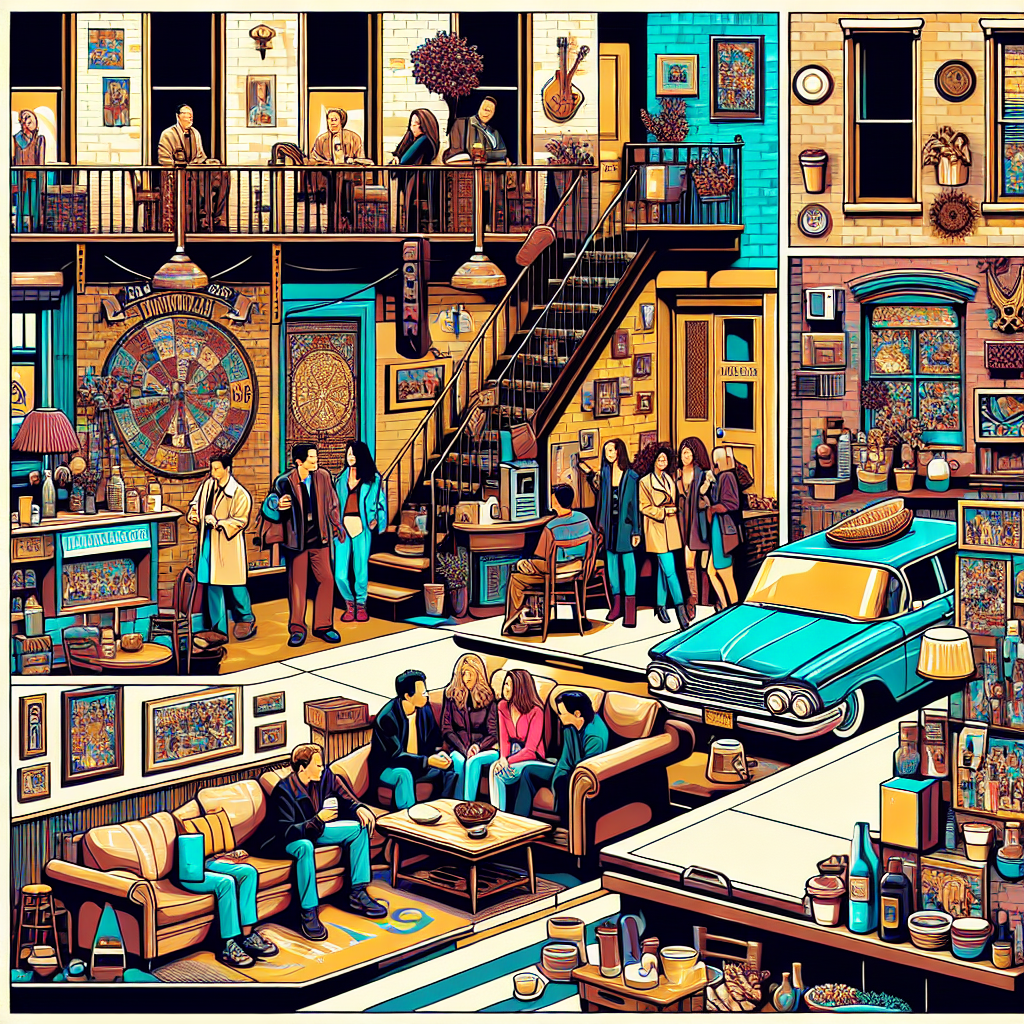Title: An In-Depth Analysis of "Friends" (1994): A Television Phenomenon
Introduction
Debuting on September 22, 1994, "Friends" rapidly ascended to cultural icon status, resonating with audiences and solidifying its place in television history. Created by David Crane and Marta Kauffman, and produced by Kevin S. Bright, the show was a linchpin of NBC’s "Must See TV" lineup. Across its ten seasons, "Friends" was more than a sitcom; it became a cultural touchstone that profoundly influenced the television landscape and popular culture. Its significance is evident not only in its enduring popularity but also in how it shaped subsequent TV dramas and ensemble comedies.
Main Themes
"Friends" centers around six main characters – Ross Geller (David Schwimmer), Monica Geller (Courteney Cox), Rachel Green (Jennifer Aniston), Chandler Bing (Matthew Perry), Joey Tribbiani (Matt LeBlanc), and Phoebe Buffay (Lisa Kudrow) – as they navigate the challenges of adulthood in New York City. The show’s themes of friendship, love, career struggles, and personal growth are encapsulated in its portrayal of these characters living through the ebbs and flows of everyday life.
Character Arcs
-
Rachel Green: Rachel’s journey from a spoiled, runaway bride to a self-reliant fashion executive encapsulates the show’s focus on personal growth and independence. Her evolution is depicted through pivotal episodes such as "The One Where Rachel Quits" (Season 3), highlighting her shift from privilege to perseverance.
-
Ross Geller: Ross’s character arc is marked by his tumultuous romantic relationships, especially with Rachel, and his struggles in his professional life as a paleontologist. Episodes like "The One with Ross’s Wedding" (Season 4) and "The One Where Ross Got High" (Season 6) encapsulate his tendency to be uptight and his journey towards self-acceptance.
-
Monica Geller: Monica’s journey is deeply intertwined with her quest for romantic fulfillment and professional success. Her marriage to Chandler in "The One with Monica and Chandler’s Wedding" (Season 7) is a gratifying culmination of her character’s relentless pursuit of happiness and stability.
-
Chandler Bing: Chandler’s arc primarily revolves around overcoming his commitment issues and insecurities. His relationship with Monica allows him to confront his vulnerabilities, as seen in episodes like "The One where Everybody Finds Out" (Season 5).
-
Joey Tribbiani: Joey’s character remains relatively consistent, embodying the archetype of the lovable but dim-witted friend. However, his career in acting and his dedication to his friends add depth, particularly in "The One with Joey’s Big Break" (Season 5).
- Phoebe Buffay: Phoebe’s quirky and often unpredictable personality is underpinned by a tragic backstory, making her evolution towards stability and finding love particularly poignant. Episodes like "The One with the Embryos" (Season 4) reveal layers to her character.
Narrative Techniques
"Friends" employs several narrative techniques that contribute to its enduring impact:
-
Consistent Use of Catchphrases and Running Gags: Phrases like "We were on a break!" and "How you doin’?" became part of everyday lexicon, anchoring the characters in viewers’ minds.
-
Flashbacks: "The One with the Prom Video" (Season 2) is a perfect example of how flashbacks are used to add depth to the characters’ pasts, solidifying viewer empathy and investment.
-
Cliffhangers: The use of cliffhangers, particularly in season finales, kept audiences eagerly anticipating the next installment, such as the enigmatic ending of "The One with Ross’s Wedding: Part Two" (Season 4).
- Interwoven Storylines: The show frequently interweaves multiple plotlines, providing a dynamic and multi-faceted narrative approach. For instance, "The One Where Everyone Finds Out" skillfully balances Chandler and Monica’s secret relationship with Ross getting his new apartment.
Cultural, Social, and Historical Contexts
"Friends" both reflected and influenced the societal norms and values of the 1990s and early 2000s:
-
Cultural Representation: The show celebrated urban life and the diverse experiences of young adults. Iconic locations like Central Perk became symbolic of the social havens for twenty-somethings.
-
Social Dynamics: "Friends" subtly addressed issues such as job insecurity, the pressure to marry, and evolving family dynamics, mirroring the shifts in societal expectations in the late 20th century.
- Historical Backdrop: Set against the backdrop of an economically prosperous, pre-9/11 America, the show painted a picture of an optimistic and carefree urban youth — a reflection of its times.
Legacy and Lasting Influence
The legacy of "Friends" is vast:
-
Influence on TV Dramas and Comedies: Shows like "How I Met Your Mother" and "New Girl" borrowed the ensemble cast format and focus on friendships and relationships.
-
Cultural Footprint: The show’s themes and catchphrases transcended the screen, becoming embedded in popular culture. The "Rachel" haircut became a fashion statement, and the show’s numerous references have permeated various facets of entertainment.
- Platform Longevity: Ever since its conclusion in 2004, "Friends" has found new life through reruns and streaming platforms, continuously attracting new generations of fans.
Conclusion
Reflecting on "Friends" today, several pertinent questions emerge: How do current societal changes and technological advancements influence our perception of such iconic shows? Does "Friends", with its dated lack of diversity and occasional insensitivity to certain issues, still hold the same relevance, or does it need a critical reassessment in contemporary culture?
Ultimately, "Friends" remains a remarkable case study in television’s ability to create lasting emotional connections with its audience. It stands as a testament to the power of well-developed characters, relatable themes, and the sheer joy of sharing life’s ups and downs with friends. Critics and fans alike continue to revisit the series, perhaps searching not just for nostalgia but for timeless truths about the human experience embedded within each episode.
Got more questions? Our personalized TV Explorer AI assistant is here to help. Click here to start a conversation!
[Advertisement]
Want to see the deeper significance behind your favorite TV shows? Discover how ANY show relates to positive biblical principles with TV and Scripture GPT from BGodInspired.com. Click here to gain insights that go beyond the screen!
[Advertisement]

